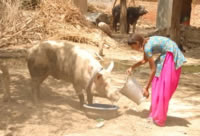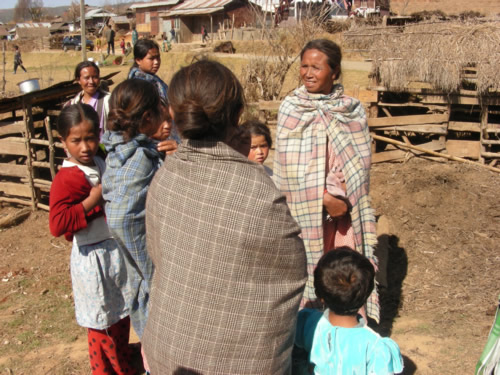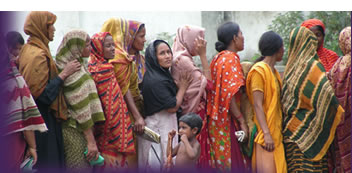STAGE 2
Identification and selection of interventions
 The second stage of the design process is to take stock of all the information collated under stage 1 and to conduct feasibility study of the aspirations and activities that rural women articulated. The second stage of the design process is to take stock of all the information collated under stage 1 and to conduct feasibility study of the aspirations and activities that rural women articulated.
Step 7: Feasibility of women’s aspirations that could be further explored for designing relevant interventions
The activities listed in Table 10 are those that were articulated by rural women in Mawphlang (see Table 6 for the full list).
Table 10. Activities identified for further exploration
| Location |
Activities Identified for Exploration |
Mawphlang,
East Khasi Hills District
Meghalay |
- Piggery: scaling it up in the backyard
- Poultry: enhanced management practices
- Agriculture/ Horticulture enhancement
- Value addition to fruits (pear, plum, peach), pickle making and potatoes
- Eco-tourism
|
In order to develop the ideas put forward in Table 10, interviews were held with the same group of respondents who articulated these ideas and also with the agencies available in the region, namely traders, finance providers, development departments, research organizations etc, which could potentially support these activities. This facilitated the analysis of the different activities (strengths and weaknesses) and the kind of support that would be required for the activities to be successful.
Table 11. Feasibility study of activities for Mawphlang
| Activity |
Strength |
Weakness |
Comments |
Piggery: Scaling it up in the backyard |
- Ample demand locally
- Proximity to Shillong
- Women have skills to rear pigs
|
- Sickness is a problem
- Need technical inputs and training
- Limited capacities in the community
- Professional veterinary assistance is available from the block. However, it is not accessible for women who are looking for assistance locally
|
- Need to create mechanisms for professional assistance in the villages
- Need for more trainings on managements aspects
|
Poultry enhanced management practices |
- Ample demand
- Skilled in rearing
|
- Sickness poses problems. Sometimes entire stock is wiped out
|
- Need to create mechanisms for professional assistance in the villages
- Need for more trainings on managements aspects
|
Agriculture/ Horticulture productivity
enhancement
|
- Known occupation
- Scope for productivity improvements exists
|
- High dependence by the people
- Size of holdings are small
- Mostly lease land farming
- Credit and markets are not well developed. Traders, money lenders and middle men provide the services currently at their terms
|
- Seed management/land management practices need to be improved
- Fruit trees can be grown in/near the homesteads
- Exposure visit to other hill states to convince farm women that better returns could be achieved through adoption of better technologies
- Small greenhouses with local material constructed during winter months
- Marketing and credit issues needs to be addressed
- Substantial numbers of women are involved in agriculture.
|
Value addition activities:
- Fruits (pear, plum , peach)
- Pickle making
- Potatoes
|
- Local production
- Local demand as well as demand from Shillong
- Some people in adjoining blocks are already doing similar activities
|
Need for training, capital, quality control and market exposure. |
- Capacity building is necessary before starting this activity
- Need integrated support (technical, financial and marketing) and hand-holding till the enterprises could stand alone
- Scope exists, and it could be explored
|
Eco-tourism |
- Picturesque block, similar to Cherapunji and proximity to Shillong, which is a tourist hub
- Sacred grove stretches for kilometres at the block
|
- SHGs could be channelised to benefit from possible eco tourism
- The ruling clans might not be responsive to the idea.
|
- Scope exists, but need more exploration and perhaps a longer time frame
|
 The feasibility study in Table 11 highlighted three activities that have the most potential to be successful. These ‘best bets’ were based on discussions with a number of groups including community groups, officials, traders, financial agencies. The three activities are: The feasibility study in Table 11 highlighted three activities that have the most potential to be successful. These ‘best bets’ were based on discussions with a number of groups including community groups, officials, traders, financial agencies. The three activities are:
- Value addition of farm/forest produce,
- Back-yard poultry and piggery,
- Agriculture/horticulture enhancement
Step 8: Identification of intervention with back-up support (including microfinance services, credit availability and access; market demand and supply of goods and services, market network; knowledge based institutions and other service providers and value addition possibilities)
Organisation support is required to underpin the three activities identified in Step 7.
Table 12. Organisational support to underpin activities in Mawphlang
| Programme: Mawphlang, Meghalaya |
Support Services Needed |
Support and service providers |
Value Addition of farm/forest produce |
- Training in how to grade, packaging, quality control.
- Maintaining standards, marketing back-up and tie-up
(There are a few individuals making juices from fruits and selling in the Shillong market.) |
- Training on value addition-Rural Resource and Training Centre.(R.R.T.C.). (The few individuals who have undertaken trainings initially from this institute are practising as well).
- Capacity of government organisations and NGO to deal with these issues is very weak. There are few church sponsored organisations, which have started working recently on livelihood issues. People tend to trust them more than the other agencies.
|
Back Yard Poultry and Piggery |
- Majority of the households are rearing pigs and hens
- Need training on scientific management practices and disease prevention
- Need credit to buy piglings and feed
|
- Government organisations (including veterinary departments) are not functional
- Possibilities of training para vets needs to be explored
|
Agriculture/Horticulture Enhancement |
- Exposure visit to hill states to make the community believe that in winters something can be grown and sustained.
- Input related training and information dissemination required.
- Marketing tie-ups through SHGs need to be mobilised to take the benefit of economies of transportation. Defunct co-operatives existing in areas.
|
Agency for Sustainable Development – an NGO formed by the in the region is keen to take lead. However, would require funding and technical support. |
|
|
|
|


